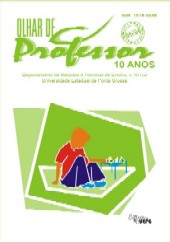AVALIAÇÃO EM DOIS TEMPOS NO TRABALHO COM O TEXTO
Main Article Content
Abstract
Se o ensino de Língua Portuguesa vem acolhendo diversas formas de trabalho pautadas na unidade do texto, a continuidade de um modelo de análise lingüística preponderantemente oltado para o âmbito intra-oracional não tem fornecido critérios claros de avaliação nesse nível. Este artigo apresenta dois exemplos de exercícios com base nos quais se discute uma forma de avaliar a leitura e escrita no âmbito do texto, lançando mão, para tanto, de elementos da Lingüística Textual. O tipo de avaliação que se propõe dá-se em dois tempos: um momento “prognóstico”, em que, a partir da produção do aluno, procura-se levantar questões específicas a serem ensinadas; e um momento “diagnóstico”, em que se elaboram instrumentos para verificar os efeitos do trabalho em classe sobre as questões específicas levantadas inicialmente.
Downloads
Article Details
Authors who publish in this journal agree with the following terms:
a) Authors keep the copyrights and concede the right of its first publication to the magazine. The work piece must be simultaneously licensed on the Creative Commons Attribution License which allows the paper sharing, and preserves both the author identity and the right of first publication to this magazine.
b) Authors are authorized to assume additional contracts separately, to not-exclusively distribution of the paper version published in this magazine (e.g.: publish in institutional repository or as a book chapter), with the author identity recognition and its first publication in this magazine.
c) Authors are permitted and stimulated to publish and distribute their papers online (e.g.: in institutional repository or on their personal webpage), considering it can generate productive alterations, as well as increase the impact and the quotations of the published paper.
d) This journal provides public access to all its content, as this allows a greater visibility and reach of published articles and reviews. For more information on this approach, visit the Public Knowledge Project, a project that developed this system to improve the academic and public quality of the research, distributing OJS as well as other software to support the publication system of public access to academic sources.
e) The names and e-mail addresses on this site will be used exclusively for the purposes of the journal and are not available for other purposes.

This work is licensed under a Creative Commons Attribution 4.0 International License.

